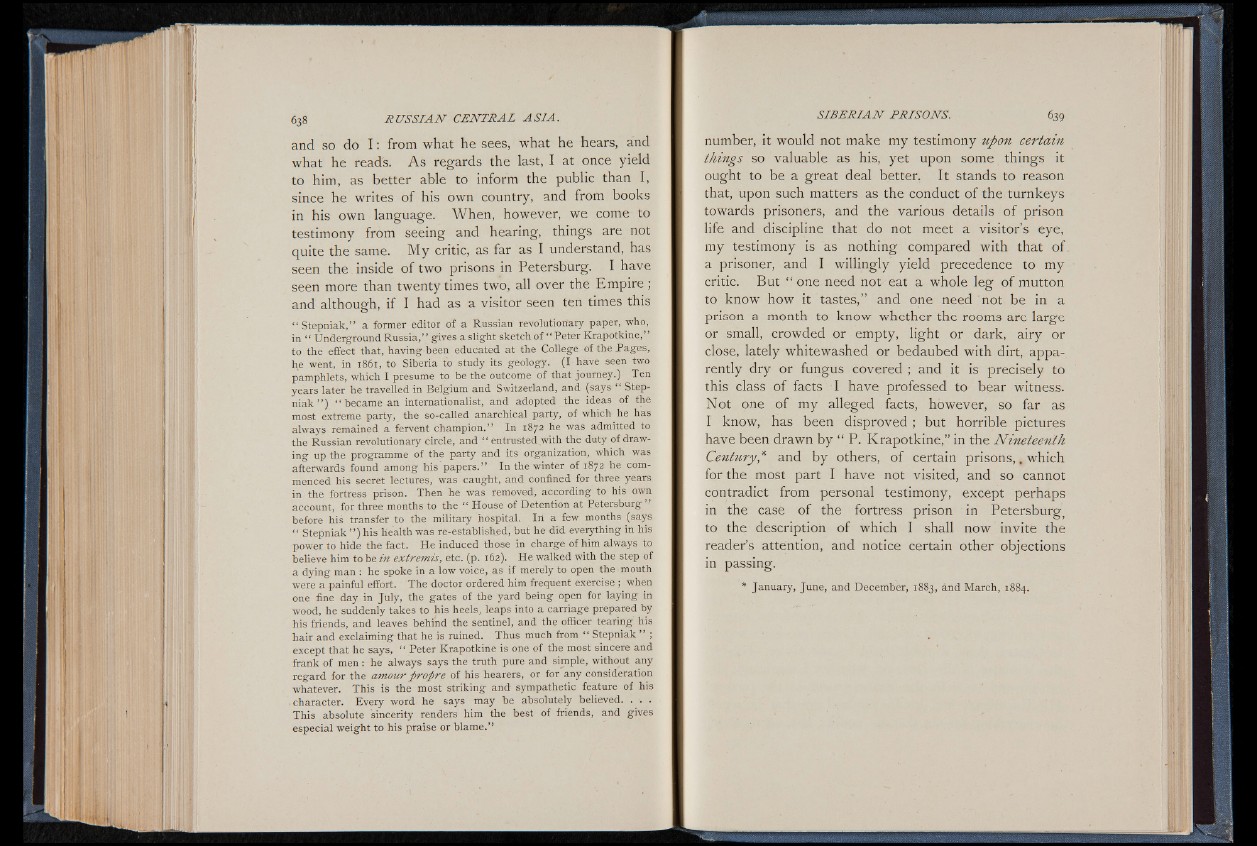
and so do I : from what he sees, what he hears, and
what he reads. As regards the last, I at once yield
to him, as better able to inform the public than I,
since he writes of his own country, and from books
in his own language. When, however, we come to
testimony from seeing and hearing, things are not
quite the same. My critic, as far as I understand, has
seen the inside of two prisons in Petersburg. I have
seen more than twenty times two, all over the Empire;
and although, if I had as a visitor seen ten times this
“ Stepniak,” a former editor of a Russian revolutioifary paper, who,
in “ Underground Russia,” gives a slight sketch of “ Peter Krapotkine,”
to the effect that, having been educated at the College of the Page s,
he went, in 1861, to Siberia to study its geology. (I have seen two
pamphlets, which I presume to be the outcome of that journey.) Ten
years later he travelled in Belgium and Switzerland, and (says Stepn
ia k ” ) “ became an internationalist, and adopted the ideas of the
most extreme party, the so-called anarchical party, of which he has
always remained a fervent champion.” In 1872 he was admitted to
the Russian revolutionary circle, and “ entrusted with the duty of drawing
up the programme of the party and its organization, which was
afterwards found among his'papers.” In the winter of 1872 he commenced
his secret lectures, was caught, and confined for three years
in the fortress prison. Then he was removed, according to his own
account, for three months to the “ House of Detention at Petersburg ”
before his transfer to the military hospital. Irt a few months (says
“ Stepniak j his health was re-established, but he did everything in his
power to hide the fact. He induced those in charge of him always to
believe him to be in e x t r em is , etc. (p. 162). He w alked with the step of
a dying man : he spoke in a low voice, as if merely to open the mouth
were a painful effort. The doctor ordered him frequent exercise ; when
one fine day in July, the gates of the yard being open for laying in
wood, he suddenly takes to his heels, leaps into a carriage prepared by
his friends, and leaves behind the sentinel, and the officer tearing his
hair and exclaiming’that he is ruined. Thus much from “ Stepniak ” ;
except that he says, “ Peter Krapotkine is one of the most sincere and
frank of men : he always says the truth pure and simple, without any
regard for the a m o u r j> r o £ r e of his hearers, or for any consideration
whatever. This is the most striking and sympathetic feature of his
character. Every word- he says may be absolutely believed. . . .
This absolute sincerity renders him the best of friends, and gives
especial weight to his praise or blame.”
number, it would not make my testimony upon certain
things so valuable as his, yet upon some things it
ought to be a great deal better. It stands to reason
that, upon such matters as the conduct of the turnkeys
towards prisoners, and the various details of prison
life and discipline that do not meet a visitor’s eye,
my testimony is as nothing compared with that of
a prisoner, and I willingly yield precedence to my
critic. But “ one need not eat a whole leg of mutton
to know how it tastes,” and one need not be in a
prison a month to know whether the rooms are large
or small, crowded or empty, light or dark, airy or
close, lately whitewashed or bedaubed with dirt, apparently
dry or fungus covered ; and it is precisely to
this class of facts I have professed to bear witness.
Not one of my alleged facts, however, so far as
I know, has been disproved ; but horrible pictures
have been drawn by “ P. Krapotkine,” in the Nineteenth
Century,* and by others, of certain prisons,, which
for the most part I have not visited, and so cannot
contradict from personal testimony, except perhaps
in the case of the fortress prison in Petersburg,
to the description of which I shall now invite the
reader’s attention, and notice certain other objections
in passing.
* January, June, and December, 1883, and March, 1884.